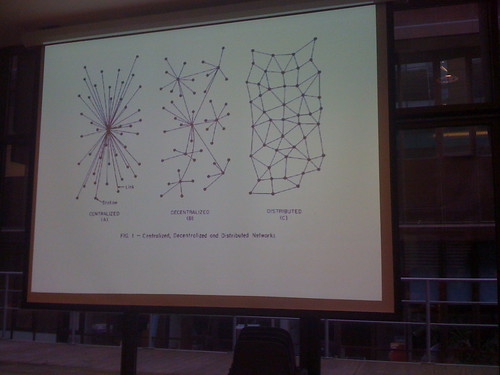The glass-topped coffee table is strewn with empty beer cans, crisp packets, half eaten pots of guacamole and salsa, orange peel and empty blister packs. A bottle of vodka is being passed around; some people are complaining of “feeling a bit weird”.
But this isn’t a student flat at 6am in the morning, or even a Tracey Emin art installation, it’s the plush offices of the Guardian Newspaper in central London, and this is a scheduled session at 5pm on the first day of BarCamp London 6.
Dutch java programmer and internet entrepreneur Reinier Zwitserloot has brought along some “Mysterious Fruit” tablets from Taiwan to share. The aspirin sized pink pills, which dissolve in a couple of minutes on our tongues, alter the chemical balance of our tastebuds almost immediately.
Everything becomes unbelievably sweet. Guacamole and salsa taste like some sort of strawberry jam, lemons seem as if they’ve had sugar sprinkled liberally on them, and the vodka becomes a sickly-sweet alcopop.
“As soon as I discovered these tablets,” says Reinier, a mischievous glint in his eye: “I thought: gotta do a session at BarCamp.”
Reinier’s session is taking place alongside more high-level talks such as “Experiments in data portability” and “Faster front-end development with Textmate”. Some sessions have provocative titles (“Making kickass video navigation” or “Reading everyone’s deleted Tweets”). And some are clearly there for fun: a techie version of “Just A Minute”, a musical pub quiz, even an “action theatre” (drama) workshop.
Later this evening, after the unofficial schedule draws to a close at 8.30pm, there’ll be rounds of Werewolf and Semantopoly (traditional BarCamp games) and snacks, beer and deep conversation long into the night. Then, tomorrow, everyone will be up bright and early for another whole day of informative (and irreverent) lectures, discussions and workshops. And then it’s back to work – for most – on Monday.
BarCamps generally take place over a weekend. And might be considered a strange way for people to volunteer to spend their free time. But BarCamping is becoming a bit of a cultural phenomenon. Since the first BarCamp was run in the offices’ of Ross Mayfield’s Socialtext in the summer of 2005, and the format was made open and available to everyone via the BarCamp wiki, the concept has spread like wildfire, not only among the geek and internet community, but also out into the wider business world.
Why is the format so popular?
Well, the number one rule of a BarCamp is that there is no pre-determined schedule, and no designated speakers. This is a “user-generated” conference – the delegates are the speakers. At the start of day one, anyone who wants to run a session writes their topic on a post-it note and sticks it up on the blank schedule “grid” (which will be up on a wall somewhere). The sessions can be on absolutely any topic and in any style. This means that traditional ideas of hierarchy and deference are automatically dispensed of – everyone’s voice can be heard, and everyone gets the chance to be talked about.
Coverage of the event is also as “open” as possible, with participants encouraged to record, blog, tweet and transmit the minutiae of their BarCamp experience to the outside world.
Amidst the silliness and irreverence, many serious discussions are had, and firm friendships are made, consolidated and re-established. The atmosphere is one of earnest frivolity. The idea is that fun, work and learning should not be mutually exclusive.
What do the participants at BarCamp London 6 hope to get out of it?
Mark Norman Francis (ex Yahoo): “I’ve been to quite a few BarCamps. BarCamp London 1 was organised by and run at Yahoo. If you go to a conference, it’s usually very expensive. You assume high relevance and good quality speakers, but that’s not always the case. Being very technical and working for Yahoo, I’m surrounded by some of the techie-est people in the world. You sit in the audience and think, why am I paying to hear this?”
Simon Willison (co-creator, Django): “At conventional conferences you have this big difference between the attendees and the speakers. The speakers all network with each other in a different place to the attendees. With BarCamps, you don’t have that.”
Ryan Alexander (YouDevise): “There is a hierarchy, but there’s also equitability of spirit. You come here to get ideas from other people. I feel really energised when I go back into work. It gives me a sense of security – nerd security! You have animated, passionate discussions with people. It’s an interest meritocracy rather than a knowledge meritocracy.”
The inclusive, dynamic structure may be why the BarCamp format has been replicated not only globally (BarCamps now take place in at least 68 countries), but across industries. There are BarCamps in banking (BarCampBank), government (Gov2.0Camp), medicine (HealthCamp), education (EduCamp) and entrepreneurship (SeedCamp).
There are different versions of the BarCamp theme within the geek/internet community, such as PodCamp (podcasters), WordCamp (bloggers) and SocialMediaCamp. And variations on the BarCamp format: MiniBarcamp and MobileCamp.
I’m sure that business has much to learn from BarCamp’s informal, flattened, highly interactive structure. But the geek community has particular enthusiasm and dedication – and I wonder just how inherent that is to other sectors and disciplines?





